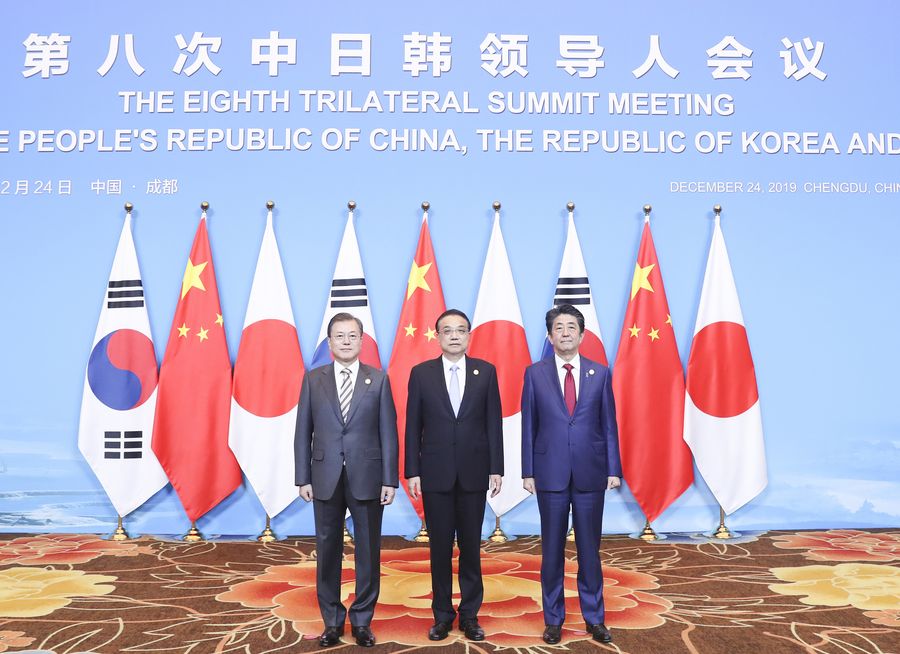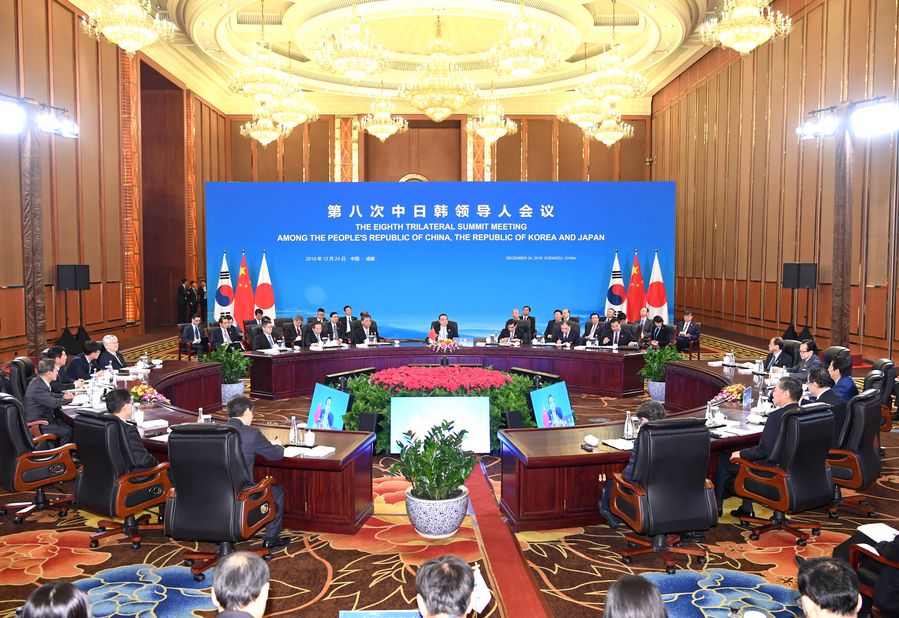
Chinese Premier Li Keqiang poses for a group photo with President of the Republic of Korea (ROK) Moon Jae-in and Japanese Prime Minister Shinzo Abe before the 8th China-Japan-ROK leaders' meeting in Chengdu, southwest China's Sichuan Province, Dec. 24, 2019. (Xinhua/Yao Dawei)
CHENGDU, Dec. 24 (Xinhua) -- The following is the English version of the full text of the Trilateral Cooperation Vision for the Next Decade released by China, the Republic of Korea (ROK) and Japan on Tuesday.
Trilateral Cooperation Vision for the Next Decade
On the occasion of the twentieth anniversary of China-ROK-Japan Cooperation, Premier of the State Council of the People's Republic of China Li Keqiang, President of the Republic of Korea Moon Jae-in and Prime Minister of Japan Abe Shinzo held the Eighth Trilateral Summit on 24 December 2019, in Chengdu, China, to review the course of trilateral cooperation and look ahead to a brighter future.
We recalled that two decades ago, visionary leaders of China, the ROK and Japan launched the trilateral cooperation in the wake of the Asian financial crisis. Over the past 20 years, the three countries have constantly enhanced mutual trust, deepened cooperation, and pursued common development. We have established 21 ministerial meetings and more than 70 dialogue mechanisms, which have combined to serve as a main platform for discussions on greater cooperation among the three countries. We have also established the Trilateral Cooperation Secretariat in 2011 with the aim to further promote trilateral cooperation. Trade volume among the three countries increased from US$130 billion in 1999 to more than US$720 billion in 2018. The combined GDP of the three countries as a percentage of the global total rose from 17% to 24%. Trilateral cooperation has played an important role in promoting regional and global economic growth as well as driving regional integration process.
We shared the view that the next decade will witness profound changes in the international community, the emergence of new global growth drivers and rapid advance of the scientific and technological revolution and industrial transformation. The interests and future of all countries are more intertwined than ever before. It is increasingly important for us, as important countries responsible for peace and stability in Asia, to enhance trilateral cooperation and work together with other countries to make active and due contributions to a wide range of issues facing the region and the international community. Stronger trilateral cooperation serves the common interests of our countries and peoples, and will contribute significantly to the peace and development of the region and world. We reaffirmed that sound bilateral ties are an important foundation for the trilateral cooperation, and that the deepening of trilateral cooperation, in turn, contributes to each bilateral relationship. Reaffirming that the three countries share everlasting history and infinite future, we will continue to cooperate according to the common recognition reached at the 2018 Trilateral Summit. We should plan the trilateral cooperation from a long-term and strategic perspective and work to develop a future-oriented cooperation model featuring peace, friendship and mutual benefit to make the trilateral cooperation a platform for peace, stability and regional cooperation and an important force for world development and prosperity. We will keep our joint efforts to further enhance regional dialogue and trust, including holding academic discussions under framework of Trilateral Cooperation with participations from other relevant partners.

Chinese Premier Li Keqiang, President of the Republic of Korea (ROK) Moon Jae-in and Japanese Prime Minister Shinzo Abe attend the 8th China-Japan-ROK leaders' meeting in Chengdu, southwest China's Sichuan Province, Dec. 24, 2019. (Xinhua/Zhang Ling)
With this in mind, we jointly decided to:
I. Work together to improve trilateral cooperation. We concur on the significance of holding the Trilateral Summit and the Trilateral Foreign Ministers' Meeting on a regular basis to promote the healthy and stable development of trilateral cooperation. We will make joint efforts to create positive atmosphere for regularizing those meetings. We acknowledge the achievements made by the Trilateral Cooperation Secretariat (TCS) and support the continuous capacity-building of the TCS. We share the view that the Trilateral Cooperation Fund can provide support for projects aiming to promote trilateral cooperation.
II. Maintain durable peace and security. We will enhance communication on strategic issues and political mutual trust, in the spirit of mutual respect, manage differences properly and develop long-term relations of peace and friendship. We are committed to the complete denuclearization of the Korean Peninsula. We reaffirm that maintaining peace and stability on the Korean Peninsula as well as in Northeast Asia is our common interest and responsibility. In this regard, we recall the Joint Statement on the '2018 Inter-Korean Summit' by the Leaders of Japan, the People's Republic of China and the Republic of Korea. Endeavoring to achieve peace, security and prosperity on the Korean Peninsula, we stress that it is only the international cooperation including dialogue and diplomacy on and the comprehensive resolution of concerns of the parties, in accordance with relevant United Nations Security Council Resolutions, that can achieve the complete denuclearization and permanent peace on the Korean Peninsula. The leaders of the People's Republic of China and the Republic of Korea hope that the abductions issue between Japan and the DPRK will be resolved through dialogue as soon as possible.
III. Advocate open and win-win cooperation. Regarding each other's development as opportunities, we will synergize our development strategies and raise our cooperation to higher levels. To this end, the three countries will strive to realize a free, fair, non-discriminatory, transparent, predictable and stable trade and investment environment and to keep our markets open. We reaffirm our support for the necessary reform of the World Trade Organization to improve its functions.
Understanding the crucial role of a rules-based multilateral trading system, we uphold the spirit of free trade and multilateralism and will work together to enforce existing international rules and to ensure a level playing field to foster an enabling business environment. We reaffirm our commitment described in the Joint Leaders' Statement on the Regional Comprehensive Economic Partnership released in 2019. Building upon the RCEP negotiations, we will speed up the negotiations on the Trilateral Free Trade Agreement, aiming to realize a comprehensive, high-quality and mutually beneficial Trilateral Free Trade Agreement with its own value.
We encourage more trilateral cooperation among local governments as well as enterprises through existing mechanisms. We will explore new areas and models of cooperation, and work together to promote economic globalization and free trade, to bring greater stability and certainty to the global economy.
Welcoming the successful holding and outcomes of G20 summits including the Osaka summit, the three countries will continue to enhance cooperation and show leadership under the frame of G20.
IV. Lead the way in the scientific and technological revolution. We will advance science and innovation cooperation to address common regional and global issues through existing mechanisms. We will encourage cooperation on digital economy and telecommunication. We will continue a high degree of communication and coordination among the three countries to cope with possible financial instability. We will enhance the regional financial cooperation including by strengthening the Chiang Mai Initiative Multilateralisation (CMIM) and the capacity of ASEAN+3 Macroeconomic Research Office (AMRO).
V. Enhance regional connectivity and infrastructure cooperation including transport and logistics areas. Infrastructure is a driver of economic growth and prosperity. We stress the importance of maximizing the positive impact of infrastructure to achieve sustainable growth and development, as well as the importance of economic, social, financial, fiscal and environmental sustainability of projects, and reaffirm the need to promote sustainable, high quality infrastructure in line with broadly accepted international principles, to facilitate trade, investment and service competitiveness in the region.
VI. Reaffirm our commitment to achieve the 2030 Agenda for Sustainable Development. We stress that eradicating poverty in all its forms and dimensions, including extreme poverty, is the greatest global challenge and an indispensable requirement for sustainable development. We will further enhance our cooperation in economic, social and environmental dimensions. We underline the significance of cooperation in circular economy and resource efficiency, agriculture, forestry, fisheries, and arctic. We will continue to support and promote the joint efforts to tackle issues of common interest including marine plastic litter, air pollution, biodiversity loss, invasive alien species management, and trans-boundary animal diseases. We will promote healthy and active ageing through comprehensive policy measures. We will also continuously strengthen cooperation in disaster risk reduction in line with the "Sendai Framework for Disaster Risk Reduction 2015-2030" and universal health coverage supported by robust financing in a sustainable manner. We recognize the urgent need to address climate change by taking feasible and concrete actions. We reiterate our strong commitment to fully implementing the United Nations Framework Convention on Climate Change and Paris Agreement.
VII. Promote mutual learning in the fields of culture and people-to-people exchange. We will carry forward East Asia's cultural traditions, and foster East Asian win-win cooperation. Taking the historical moment of the Olympic and Paralympic Games held successively in the three countries, we will promote further the spirit of friendship and collaboration by enhancing sports cooperation. Through diverse cultural and educational exchange activities for people-to-people engagement, we will continue to enhance understanding and trust among our peoples, and lay a stable, healthy and friendly social foundation for the trilateral cooperation. We will actively promote tourism exchange and deepen the mutual trust among our peoples.
VIII. Achieve overall revitalization and common development. We will expand the depth and width of the trilateral cooperation, fully harness each other's comparative advantages, and extend the benefits of the trilateral cooperation to other countries and regions. We will advance the "Trilateral+X" cooperation, by jointly making plans and taking collective actions to expand cooperation with other countries, help narrow regional development gaps and achieve common development. ■



